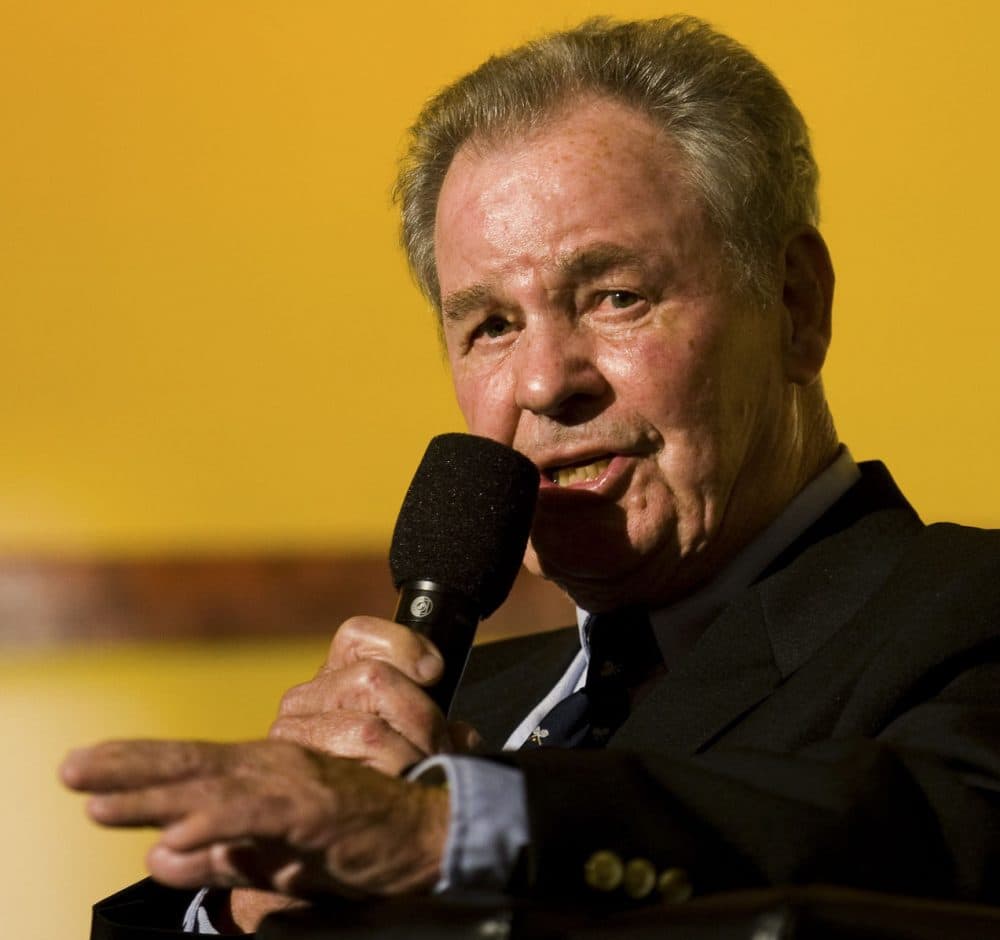Advertisement
Remembering Barney Hall: Legendary NASCAR Broadcaster Dies At 83
Resume
Barney Hall died this week at the age of 83.
For more than 50 years, Hall delighted radio listeners with his signature calls of NASCAR races. In the 1970s, he helped establish the Motor Racing Network. Hall's friend and former colleague, ESPN's Ryan McGee, penned a remembrance of Hall this week. He joined Bill Littlefield to tell his favorite story about the beloved radio broadcaster. It takes place not on the racetrack, but somewhere in the air over southern Michigan.
"This is sometime in the 1970s," McGee begins. "You have three gentlemen. You have a legendary racer in David Pearson who's flying the plane and who, quite honestly, hasn't done a lot of flying at this point. You have Dick Brooks, who was not a great race car driver, but who was a great storyteller and about to become a radio broadcaster. And then Barney Hall. And Barney was never a race car driver. He was a radio man. Pearson just bought a prop plane and said, 'I'm gonna start flying to the race track. Hey, I'm a race car driver. Flying a plane can’t be much different, right?’ Now, he may have been the greatest stock car driver of all time, but at this point Pearson was still somewhat of a rookie pilot.
So, with a rookie pilot at the controls of a prop plane on its way from Spartanburg, South Carolina to the Michigan International Speedway, Barney Hall began to tell his life story.
"Here's a man that grew up in the hills of North Carolina right along the border of Virginia, where Junior Johnson, who became a great friend of Barney Hall, all these guys were bootleggers. They were moonshine runners. This is where NASCAR started. That's where Barney Hall grew up, in Elkin, North Carolina. He joined the Navy, saw the world, became a radio man and a diver in the Navy, and then went back home and started becoming the DJ at the only radio station in town.
"Dick said to Barney, ‘Man, what a life you've had. I feel like you'd be ready to go. If it was time for your life to end today, you'd be ready to go.’ And Barney always joked, ‘Well, yeah. I guess so.’ Well then, right about that time, the plane was struck by lightning. David Pearson is an ice-water-in-his-veins race car driver. He's going to land the plane. Dick Brooks is a race car driver, he's like, ‘Well, we'll figure this out.’ Barney Hall is a radio man. He started physically trying to claw his way out of the plane. And so whenever Dick Brooks, David Pearson or Barney Hall ever told this story, Pearson in particular likes to say, ‘It turns out, we thought Barney was ready to go. He was not ready to go quite yet.’ And Barney always replied, ‘Not that day, ‘cause I didn’t have a ticket.’"
BL: Did you immediately think of this story when you learned that Barney Hall had died earlier this week?
RM: I did. People like myself who grew up listening to Barney Hall — he's one of these voices. It's the soundtrack of your life. Part of what made Barney so great at his job was, he was a storyteller. And so, while everyone else is screaming and yelling and covering the race, Barney would do that, but Barney would also punctuate his broadcasts with those stories — humanizing these seemingly inhuman stock car racing heroes. And he always had a punchline, and that’s why he was so beloved. And that's why the NASCAR community is a very sad place this week.
BL: You have written about him in such a way that he really seemed to have a soft spot for the little guy. Is that about right?
RM: Yeah. If there was a team that he knew had been struggling — a bare-buckets team that was trying to keep up with the Richard Pettys and the David Pearsons and the Dale Earnhardts of the world, if that car managed to make its way into the top-10 — even if it just had a good pit stop — Barney would always say, "Give a call to Dave Marcus," or "Give a call to J.D. Stacy," "Give a call" to somebody. Because he always was looking out for those teams that he knew were working probably twice as hard as the big money teams just to make the race.
BL: You have also written, “He was auto racing’s answer to Red Barber or Vin Scully. While others shouted over the action, he described the action as if he was reading us all the greatest bedtime story ever.” How does an announcer working NASCAR do that? It's loud there, man.
RM: I don't know. And you're talking to someone who — I do TV live shots from all these race tracks all the time and I have to shout because that’s the only way my voice is going to cut through the loudest sport in the world. But Barney just — his voice just cut right thought it. And I can remember it as a kid: everybody's shouting over everything all the time, and then Barney would just, "And give a call to so-and-so." And it would just cut through those race cars, and it cut through to people. That's why they always felt a connection with him all those years and all those races that he broadcast.
This segment aired on January 30, 2016.
